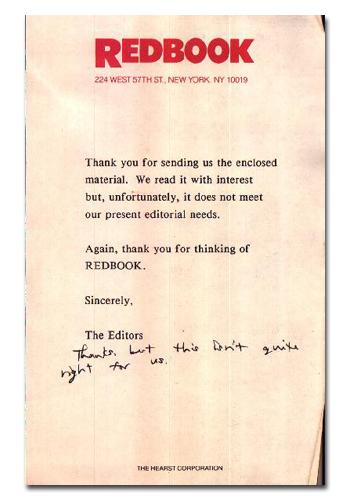Rejection
Burnout |
Rejection |
Sexual Chemistry |
Six Tips for Writing Better Time Travels
Good Advice |
The Daily Page

Posterity: What you write for after being turned down by the publishers.
--George Ade
No uplifting thoughts on the importance of a handwritten rejection letter, no pious sermons on
how rejection is good for your soul. I'm going to give it to you straight.
Truth #1: Rejection stinks.
Truth #2: You are going to be rejected.

Rejection, unfortunately, is the flip side of writing for publication. Only writers who write solely
for pleasure and consign each of their efforts to the lower left-hand desk drawers can manage to avoid rejection.
If that description fits you, that's great. You're a fortunate person. You'll never know how awful it
feels to be rejected.
And you'll never know how wonderful it feels to be accepted, either.
Rejection is part of the game and, if you're going to play the game, you'd better get used to it quickly or your career will be shortlived.
Tough words? Yes. But then this is a tough business.
Now I'm not saying you should keep a stiff upper lip and celebrate each rejection, or thank an editor for scrawling "no" in red ink
on the cover page of your manuscript. As a matter of fact, if you feel like exercising your vocabulary of four letter words or going
on a 24 hour chocolate chip cookie jag, this is the time to do it.
Vent your anger and your pain and your frustration. Tell your husband that the editor who just rejected you got her degree
from the Ultissima School of Beauty. Tell your best friend you plan to turn your word processor into a planter. Tell your
cat you'd find more satisfaction in frying fish sandwiches at the local McDonald's.
Get it all out of your system in the privacy of your home and then, the very next day, get that manuscript back
in the mail and get yourself back to work. Take time to learn how to minimize your chances of rejection. Learn your markets
and review those markets every few months. Polish your material. Send out clean, crisp manuscripts that look as untouched
as a 60s Harlequin heroine.
When you've exhausted the whole circuit of possibilities, reevaluate the manuscript. Is it outdated?
Weak? Have a number of books with similar plot lines appeared lately? If so, retire the manuscript with an eye toward possible
revamping in the future.
Be realistic. Writing a bestseller requires hard work; marketing one requires even more. Don't expect to hit paydirt quickly.
It may take twenty rejections (or more) before a publisher makes an offer.
A writing teacher of mine had a short story he believed in, and he wanted to sell it to Prairie Schooner,
a prestigious literary magazine. Prairie Schooner, however, had other ideas and rejected Leonard's story its
first time out.
Leonard, however, was a professional. He swallowed his wounded pride and sent his story out again. And sent it yet again.
By the time he'd garnered 22 rejections, the editorial staff at Prairie Schooner had changed and he sent the story
back. And they rejected it again. Stalwart writer that he is, Leonard continued to study his markets and kept his story circulating.
After the 41st rejection, the staff of Prairie Schooner once again changed hands. Leonard, ever a man to recognize an
opportunity, fired his story back out to them and, lo and behold, on its 42nd try, his short story was accepted.
"Brilliant!" the acceptance letter read. "Where have you been hiding?"
My stories of rejection may not be as dramatic as Leonard's but they do serve to point out the power of perseverence.
Back when I was doing my share of short stories and articles, I received a rejection letter scrawled in eyebrow pencil on
one sheet of Charmin: a simple, powerful NO that even now, many years later, is enough to make me cringe with
embarrassment. One less-than-kind editor suggested I take my stories back to Bambi and the Disneyland forest where
they belonged.
Why, I became so adept at fielding rejection that I didn't recognize encouragement when it came my way in the
form of a letter from Nancy Coffey, who was then with Avon.
November 3, 1977
Dear Ms. Bretton:
Thank you so much for sending your proposal to Avon. At your convenience, please send
the complete manuscript.
Nice letter, I thought. Everyone probably gets a nice letter like that.
I took that nice letter and tucked it away in a drawer for the next four years. (Yes, I did learn from that
mistake. The next time opportunity hit me in the head, I hit back. Result? Love Changes, a launch book
for Harlequin American Romance.)
As I said before, this is a tough business and it's especially tough when you're trying to get your foot in
the door. I'm lucky enough to be published so it's not terribly admirable when I pick myself up after a rejection
and get back to work again. I can turn around and look at my book covers, all nicely framed and hanging on the
wall near my desk, and remind myself that I've done it before and will do it again--no matter how hard that is to
believe at the moment.
The people I most admire are the ones who are dedicated enough to keep at it against the odds. Granted, it helps to
be a little crazy because who in his or her right mind would work three months or six months or a whole year on a
project with no guarantee of success, no union, and no security?
Only a true writer, like my friend Sally, would ever be that crazy...or that dedicated to a dream.
September 4, 1985 9 PM
My manuscript came back today. Instead of Dear John letters, I get Dear Sally letters!
I'm not sure if reading it and realizing that once again I'd failed to impress an editor hurt most or realizing that it
was written and mailed on my birthday.
It's nights like these when I wonder how many more rounds I can go. When I first read the rejection, I decided,
"That's it!" I'm not working any further on the manuscript. Maybe my first reaction was the right one.
September 5th 9 AM
Today's horoscope reads, "Plans subject to change--keep options open, define terms, refuse to
be discouraged by one who lacks faith." Not bad, huh?
I'm in high gear this morning. Mostly I just feel stubborn--I feel a real determination to
sell my story. I'm still very reluctant to pack it away and wonder if, in doing so, I won't have lost my best opportunity.
I still think I'm going to make it!
I'm happy to say that Sally did make it. Five years later she sold her
first book and has since sold three more. Ports of Call, written as
Sally Fairchild, is available now.
Someone once said, "If writers were businessmen, they'd have too much sense to be writers."
Looking back on my checkered business past, I can't dispute that statement.
Writers write. We can't help ourselves. The disease is in our blood and in our bone and it colors the way we view
ourselves and the world around us. If you're truly a writer, rejection won't stop you for if you want success badly
enough, you'll persist and, ultimately, you'll triumph.
Even if it is on your 42nd try!
This article appeared previously in the Romance Writers Report, the monthly newsletter
of Romance Writers of
America.

